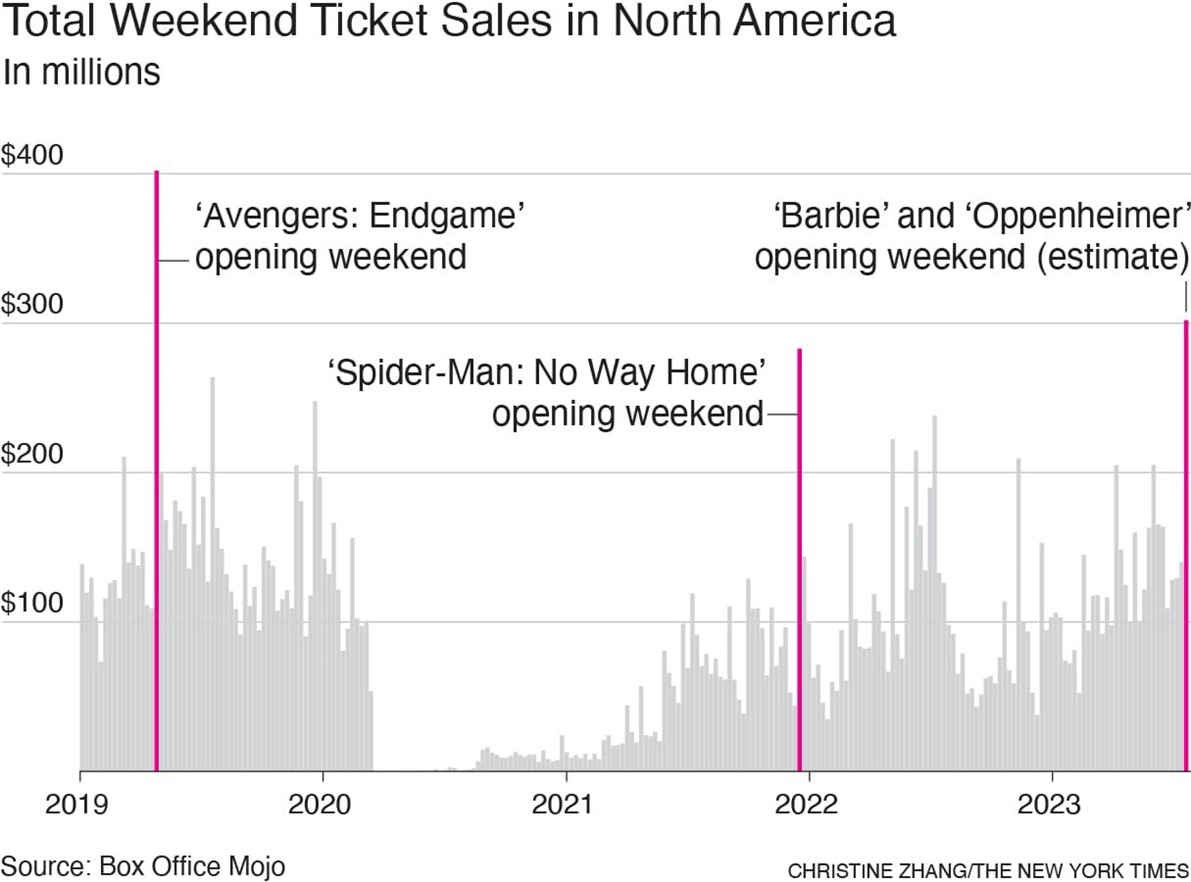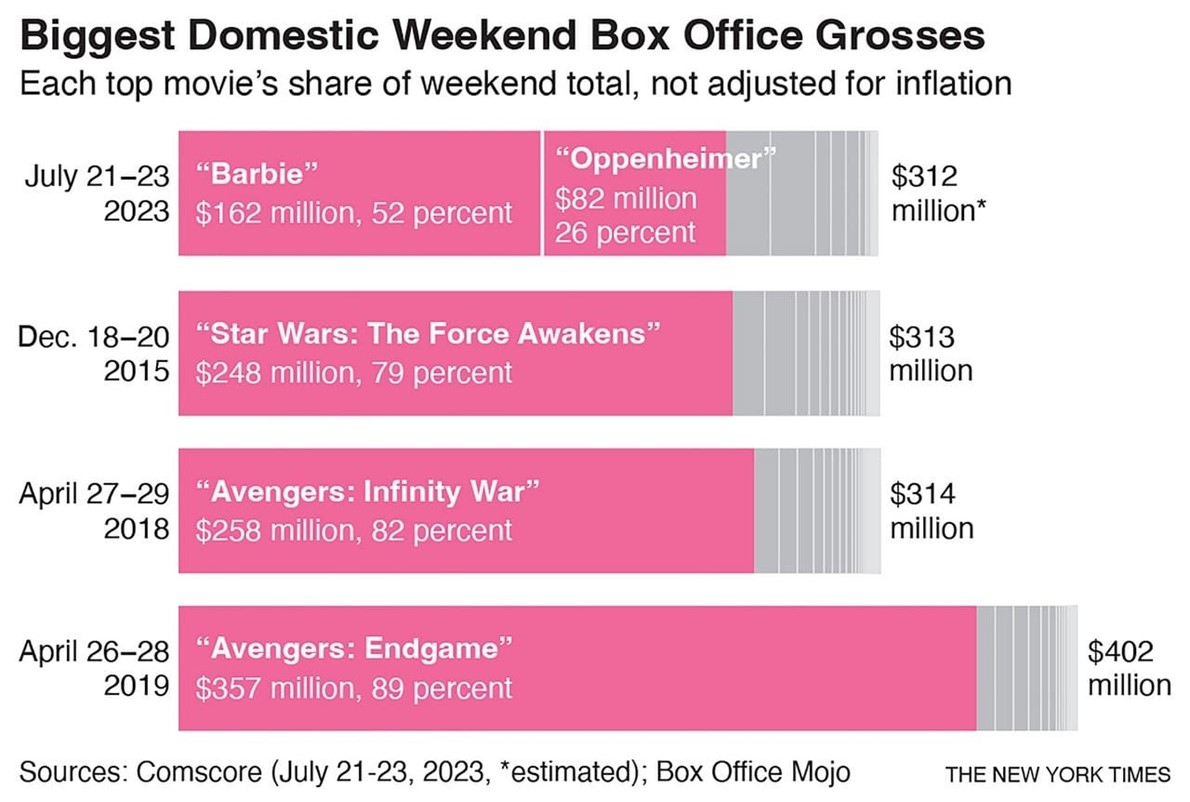The movie business lives!
Greta Gerwig’s gender wars “Barbie” and Christopher Nolan’s
nuclear war “Oppenheimer” blew past already-stratospheric prerelease
expectations at the weekend box office to collect a combined $235.5 million in
the United States and Canada, an astounding total that sent a clear message to
Hollywood: If you want to commandeer the culture, you must give moviegoers
something new — not just the same old threadbare franchises.
اضافة اعلان
“Original storytelling executed in the right way has broken
out in a really remarkable way,” said Richard L. Gelfond, the CEO of IMAX,
which accounted for 26 percent of the “Oppenheimer” turnout in North America,
selling out even 4 a.m. screenings. “These movies weren’t sequels that looked
the same as the last sequel in a long-running franchise. You might say people
noticed.”
The blockbuster turnout signaled that Hollywood has finally
bounced back from the pandemic. All told, North American multiplexes had their
biggest weekend since “Avengers: Endgame” arrived in April 2019. “Barbie” and
“Oppenheimer” powered the domestic box office to about $302 million in total
weekend ticket sales, with films such as “Mission: Impossible — Dead Reckoning
Part One” and “Sound of Freedom” contributing to the balance.
“Barbie,” a feminist manifesto wrapped in hot pink bubble
gum, sold an estimated $155 million in tickets at domestic theaters, according
to Comscore, which compiles box office data. The PG-13 comedy collected an
additional $182 million overseas. “Barbie” was released by Warner Bros. and
cost $145 million to make, not including marketing expenses, which were
considerable.
Box office analysts, using complex formulas to forecast
ticket sales, had expected “Barbie” to collect about $110 million in the United
States and Canada. Worried that the movie might underperform expectations, as
several big-budget releases have recently, including “Mission: Impossible —
Dead Reckoning Part One,” Warner Bros. predicted a conservative $75 million.
It ended up as the biggest opening of Gerwig’s career, by a
moonshot, cementing her status as one of Hollywood’s young “name” filmmakers —
directors who mainstream ticket buyers recognize as delivering singular work.
(Jordan Peele is another, along with more established cohorts such as Nolan and
J.J. Abrams.) Gerwig, who wrote the comedic “Barbie” script with her partner,
Noah Baumbach, previously directed “Little Women” (2019) and “Lady Bird”
(2017). She has been nominated for three Oscars.
It was also the biggest opening on record for a female
director, surpassing “Captain Marvel,” which was co-directed by Anna Boden and
had $153.4 million in initial ticket sales in 2019.
 The incongruous duo of
“Barbie” and “Oppenheimer” combined to sell far more movie tickets than
expected over the weekend, pushing the overall domestic box office to $311
million, according to Box Office Mojo, an online database. -- 3.9 x 2.6 -- cat=e
The incongruous duo of
“Barbie” and “Oppenheimer” combined to sell far more movie tickets than
expected over the weekend, pushing the overall domestic box office to $311
million, according to Box Office Mojo, an online database. -- 3.9 x 2.6 -- cat=e
“This is a record-shattering opening,” said David A. Gross,
a film consultant who publishes a newsletter on box office numbers. “No comedic
film of any kind has opened higher than $85.9 million over a three-day
weekend.”
“Barbie” arrived as a full-blown cultural event, with
thousands of moviegoers draping themselves in pink for screenings, doll memes
flooding social media and marketers scrambling (sometimes awkwardly) to glom
onto the moment. The audience was 65 percent female. “For a film this pink, you
would have expected the audience to be closer to 90 percent female — we got a
ton of guys,” said Jeff Goldstein, president of domestic distribution at Warner
Bros. “It exploded everywhere: large markets, small markets, coast to coast.”
Some theaters seemed to be caught off guard. One high-end
theater in the Washington, D.C., suburbs went all out on promotion, with pink
lights to highlight “Barbie” and a wall of movie posters featuring both films.
But the theater may have miscalculated Saturday attendance. By the 10 p.m.
showing, it had run out of multiple food items. It also lacked soft drinks and,
amazingly, ice.
Another theater in Arlington, Virginia, had it worse: The
air conditioning went out, leading to a sweltering experience. While the
theater offered refunds, many ticket buyers stayed.
The question now is whether Hollywood can keep the momentum
going. Studio executives have long pointed out that moviegoing begets
moviegoing — that the habit of watching movies in theaters is crucial. Coming
up, however, studios are facing another crisis: A strike by unionized actors,
which started July 14, could force movie companies to push back coming films
because striking stars cannot take part in publicity campaigns. “Challengers,”
a sports drama involving a love triangle and starring Zendaya, has already been
pushed from September to April.
There are no talks scheduled between SAG-AFTRA, as the
actors union is known, and studios.
“Oppenheimer” helped fuel “Barbie” and vice versa, with
their simultaneous release nicknamed Barbenheimer and movie fans captivated by
their wild incongruity. Nolan’s film, which cost Universal Pictures at least
$100 million to make, not including a megawatt marketing campaign, is a
three-hour period drama about Robert Oppenheimer, the man known as “the father
of the atomic bomb.” About 200,000 people had purchased tickets to see “Barbie”
and “Oppenheimer” as a double feature, according to the National Association of
Theater Owners, a trade organization.
Universal said the R-rated “Oppenheimer” collected an
estimated $80.5 million in the United States and Canada — about 60% more than
analysts had predicted before release — and an additional $94 million overseas.
The domestic audience was 62 percent male. Some IMAX locations playing “Oppenheimer”
are sold out for the coming weeks, in particular venues playing the film in 70
mm.
 With the biggest
revenues since 2019, “Barbenheimer” gives the usual franchises a run for their
money, selling out even predawn screenings. -- 3 x 4 -- cat= e
With the biggest
revenues since 2019, “Barbenheimer” gives the usual franchises a run for their
money, selling out even predawn screenings. -- 3 x 4 -- cat= e
“Barbie” and “Oppenheimer” received euphoric reviews from
critics. Ticket buyers gave each film an A grade in CinemaScore exit polls.
Hollywood urgently needed a weekend that exceeded — or even
met — expectations. This was the year when moviegoing was finally supposed to
bounce back from the pandemic, which closed many theaters for months and sped
the growth of streaming services in homes. Until now, however, the box office
has been mostly notable for disappointing turnouts for franchise sequels.
Blips of hope, including “Guardians of the Galaxy Vol. 3,”
have been blotted out by underwhelming results, especially in the United
States, for expensive franchise films such as “Indiana Jones and the Dial of
Destiny,” “Ant-Man and the Wasp: Quantumania,” “Shazam! Fury of the Gods,” “The
Flash” and “Fast X.”
What is succeeding? Characters that have not been on-screen
in recent memory (“The Super Mario Bros. Movie”), vivid new animation styles
(“Spider-Man: Across the Spider-Verse”), new chapters in series that are not as
well worn (“Creed III”) and movies that cater to audiences ignored by Hollywood
(“Sound of Freedom,” which has been promoted by the right).
For all of her world domination, Barbie has never before had
her own big-budget movie. “Oppenheimer” is based on the 2005 biography
“American Prometheus” by Kai Bird and Martin J. Sherwin.
The stronger-than-expected turnout for “Barbie” reflected,
in part, a campaign by David Zaslav, the CEO of Warner Bros. Discovery, to use
the company’s cross-promotional power in a new way. In the past, the
conglomerate has remained stubbornly siloed, even as Disney and NBCUniversal
have leveraged their empires to promote new movies.
Warner Bros. Discovery promoted “Barbie” on its television
networks, for instance, with HGTV featuring a Dreamhouse competition series and
Food Network incorporating Barbie into a “summer baking championship.” More
than 15 of the company’s networks featured pink logos and other on-air promos.
Read more Entertainment
Jordan News





